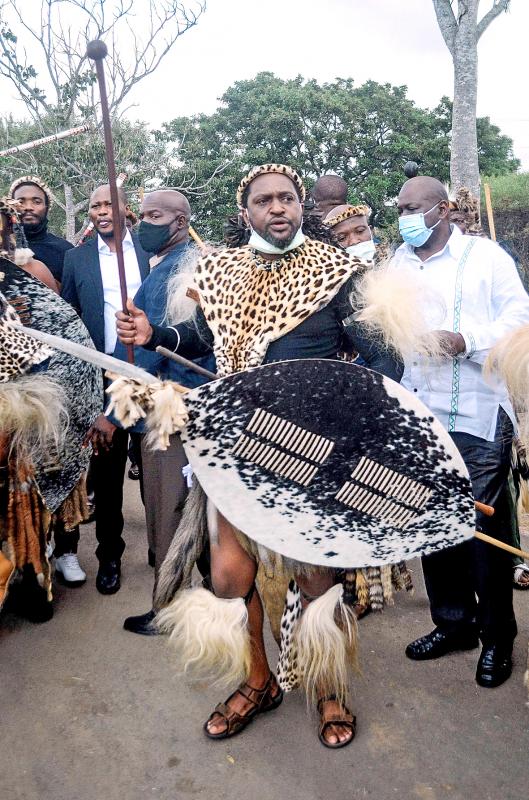The eldest son of South Africa’s late Zulu king Goodwill Zwelithini and his recently departed regent queen was on Friday named the monarch’s successor amid a turbulent succession battle.
Prince Misuzulu Zulu, 46 — whose name means “strengthening the Zulus” — was named heir in the last will of his deceased mother and queen, Shiyiwe Mantfombi Dlamini Zulu.
The will was read out on television on Friday.

Photo: AFP
The 65-year-old queen and regent died on Friday last week, weeks after she was named interim successor to her husband king Goodwill Zwelithini, the longest-serving leader of South Africa’s largest ethnic group.
Zwelithini passed away on March 12 at 72 after a half-century on the throne following a battle with a diabetes-related illness.
He left behind six wives and 28 children, and a turbulent succession battle followed.
I “hereby nominate and appoint Misuzulu Zulu ... as my successor to the throne,” the late queen’s will read out by advocate Griffiths Madonsela said.
The letter that bequeathed the monarchy to her first son was dated March 23, a day before she was named regent.
Since the death of the late queen, who was Zwelithini’s third wife and the sister of King Mswati III of Eswatini, various factions in the royal family have sought to put forward their candidates to claim the throne.
Some alleged that the regent was poisoned and that her husband’s signature was fraudulently added to his will.
Flanked by singing and dancing Zulu regiments, Prince Zulu on Friday morning made a dramatic entrance at his mother’s official memorial service, demonstrating his willingness to take over as the next monarch of the Zulu nation.
Chaos ensued on Friday after the televised reading of the will when the new successor’s brother, Prince Thokozani, stood up to voice an opinion.
He was quickly shouted down by screeching family members at the royal palace in the coastal KwaZulu Natal province, and the newly named heir was then quickly whisked away by heavily armed security.
Although the title of Zulu king does not bestow executive power, the charismatic Zwelithini had moral influence over more than 11 million Zulus, nearly one-fifth of South Africa’s population.

Asian perspectives of the US have shifted from a country once perceived as a force of “moral legitimacy” to something akin to “a landlord seeking rent,” Singaporean Minister for Defence Ng Eng Hen (黃永宏) said on the sidelines of an international security meeting. Ng said in a round-table discussion at the Munich Security Conference in Germany that assumptions undertaken in the years after the end of World War II have fundamentally changed. One example is that from the time of former US president John F. Kennedy’s inaugural address more than 60 years ago, the image of the US was of a country

Cook Islands officials yesterday said they had discussed seabed minerals research with China as the small Pacific island mulls deep-sea mining of its waters. The self-governing country of 17,000 people — a former colony of close partner New Zealand — has licensed three companies to explore the seabed for nodules rich in metals such as nickel and cobalt, which are used in electric vehicle (EV) batteries. Despite issuing the five-year exploration licenses in 2022, the Cook Islands government said it would not decide whether to harvest the potato-sized nodules until it has assessed environmental and other impacts. Cook Islands Prime Minister Mark Brown

BLIND COST CUTTING: A DOGE push to lay off 2,000 energy department workers resulted in hundreds of staff at a nuclear security agency being fired — then ‘unfired’ US President Donald Trump’s administration has halted the firings of hundreds of federal employees who were tasked with working on the nation’s nuclear weapons programs, in an about-face that has left workers confused and experts cautioning that the Department of Government Efficiency’s (DOGE’s) blind cost cutting would put communities at risk. Three US officials who spoke to The Associated Press said up to 350 employees at the National Nuclear Security Administration (NNSA) were abruptly laid off late on Thursday, with some losing access to e-mail before they’d learned they were fired, only to try to enter their offices on Friday morning

STEADFAST DART: The six-week exercise, which involves about 10,000 troops from nine nations, focuses on rapid deployment scenarios and multidomain operations NATO is testing its ability to rapidly deploy across eastern Europe — without direct US assistance — as Washington shifts its approach toward European defense and the war in Ukraine. The six-week Steadfast Dart 2025 exercises across Bulgaria, Romania and Greece are taking place as Russia’s invasion of Ukraine approaches the three-year mark. They involve about 10,000 troops from nine nations and represent the largest NATO operation planned this year. The US absence from the exercises comes as European nations scramble to build greater military self-sufficiency over their concerns about the commitment of US President Donald Trump’s administration to common defense and